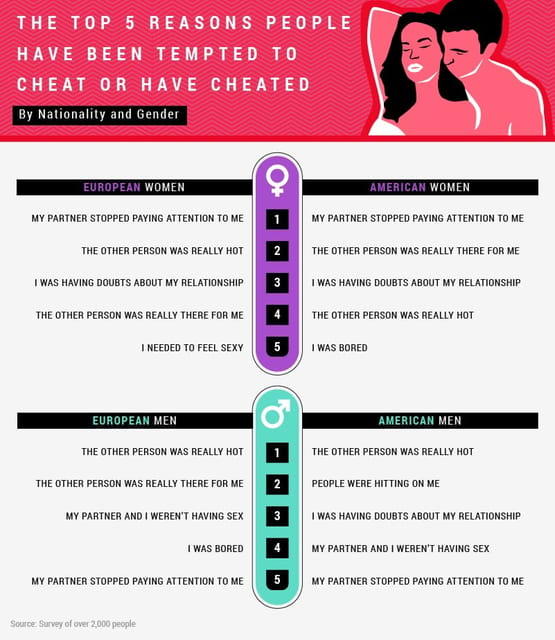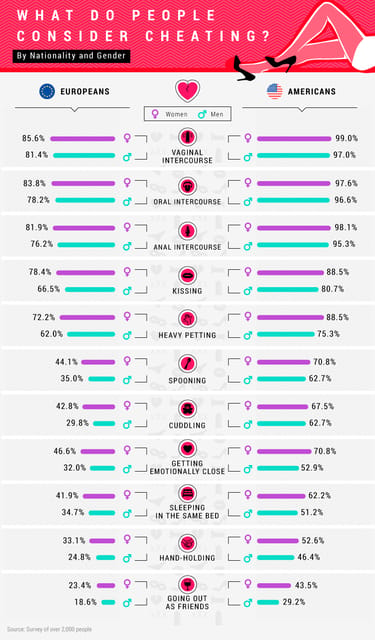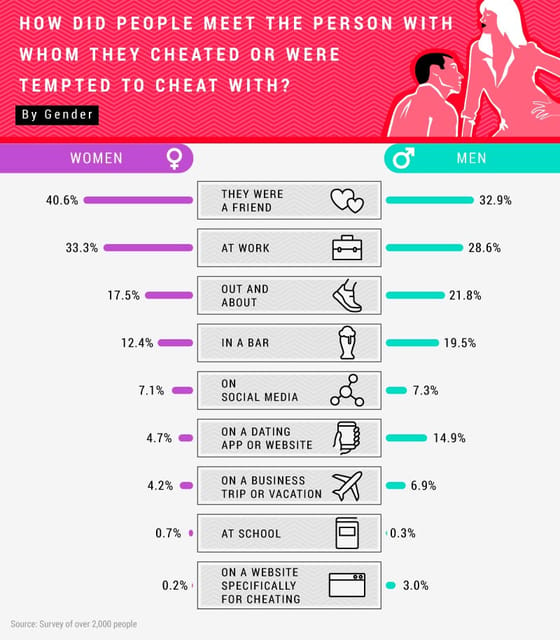There’s nothing more soul-destroying than being cheated on. Not only does it completely destroy your ability to trust, it also knocks your sense of self-worth as you wonder if you did something wrong or fell short in some way to make your partner not want to remain faithful to you. While the honest truth is that it’s never your fault, it can be hard to remember that when infidelity strikes.
It’s easy to assume that cheating is pretty much an inevitability in long-term relationships, but that’s not necessarily the case. The infidelity statistics for 2023 show that the figures differ depending on several different factors: age, gender, relationship type, and even where they live in the world.
So, without further ado, let’s dive into the truth about cheating.
How many people are cheating in their relationship?
This is an impossible question to answer with complete accuracy, largely because a) you can’t realistically ask every couple in the world about their infidelity and b) even if you could, you can’t expect everyone to give an honest answer. There’s also the fact that not everyone defines cheating in the same way. Plus, LGTBTIA+ relationships aren’t often well-represented in the studies, so that removes a large portion of the population. That being said, it does seem like cheating is extremely common.
The Journal of Marriage and Divorce puts the figures somewhere around 70% for married couples, claiming that’s the amount of people who will be unfaithful at least once in their relationship. On the flip side, the US General Social Survey is slightly less alarming, saying that about 20% of men and 13% of women are likely to cheat.
Back in 2021, Health Testing Centers polled 441 people and found that about 45% of people in monogamous relationships had affairs, with 24% of marriages that included cheating actually stayed together. However, it also noted that just under half of relationships in which one party cheated — 47.5% to be specific — enforced new rules after the infidelity to try and mitigate it happening again (think sharing phone passwords or social media accounts, etc.).
Why do people cheat on their partners?
A Superdrug survey of 2,000 people found that contrary to popular belief, most people don’t cheat on their partners because they’re unhappy and don’t love their partner anymore. However, it’s clear there are underlying issues in the relationship.
The most common reasons American women cheated on their partners weren’t all that surprising.
- Their partners stopped paying attention to them.
- The other person was really there for them.
- They were having doubts about their relationship.
- The other person was really hot.
- They were bored.
For men, the reasons appeared to be slightly less based on emotional neglect and more based on wanting to get their rocks off. However, the lack of deeper connection with their partner still played a huge role in their decision to cheat.
- The other person was really hot.
- People were hitting on them.
- They were having doubts about their relationship.
- Their partner wasn’t having sex with them.
- Their partner stopped paying attention to them.
Want a partner? Attract love with the power of your mind.
Sweetn is a new research-based startup that shows you how to call love into your life with the power of your mind. Take our quiz, and try our tools—they can transform your energy and your love life in a few weeks. Just click here.
What do people consider cheating?
According to the couples surveyed by Superdrug, there are a lot of acts that people don’t believe are kosher when you’re in a relationship.
- P-in-V intercourse: 99% of women and 97% of men consider this cheating
- Oral intercourse: 97.6% of women and 96.6% of men believe this is infidelity
- Kissing: 88.5% of women and 80.7% of men consider kissing cheating
- Heavy petting: 88.5% of of women and 75.3% of men believe this isn’t okay
- Spooning: 70.8% of women and 62.7% of men consider this unfaithfulness
- Cuddling: 67.5% of women and 62.7% believe this is cheating
Why do women cheat?
While women are just as capable of being unfaithful as men, their reasons for doing so are definitely very different than men.
According to experts, there are three main reasons women cheat on their partners: they’ve stopped feeling love for their partner, they desire an emotional connection that’s now missing from their primary relationship, and they want to feel attractive again and like attention from someone new.
Dr. Meghna Mahambrey of Ohio State University dug deeper into female cheating in 2020 (via Charlotte Observer), by looking at data collected from 1,572 people. She found that often women who have been betrayed by their partners or even experienced abuse in their relationships are more likely to justify infidelity in their relationships. She identified 5 common traits among this group:
- Women with partners who are immature and/or unfaithful might feel cheating is okay as their partners are not present or on their level.
- Lack of compassion from a partner often makes a woman feel that infidelity is okay since her partner isn’t extending warmth or understanding towards her.
- A partner who is unwilling to try new things or who remains emotionally distant often leads women to seek this type of connection elsewhere.
- Women who have partners with temper issues or whose moods are all over the place are more likely to be unfaithful.
- Often, women are led to seek excitement with new partners if their own is more insular or introverted.
Of course, this doesn’t make cheating acceptable under any of the above circumstances, but it does provide more insight into why this happens.
Why do men cheat?
As detailed above, men tend to have very different reasons for being unfaithful than women. While women tend to seek out new partners to experience a feeling of attentiveness or attractiveness, men are often looking to fulfill sexual needs or even to actively sabotage their relationships.
Writing for Psychology Today, psychologist Robert Weiss, PH.D., LCSW, CSAT, says that while many men won’t be honest about their reasons for stepping out on their partners, it all comes down to a few hard truths. They’re either immature, have addiction issues that impair their judgment, are insecure, want to end their relationships but don’t have the balls, or are selfish, just to name a few.
However, it’s not a foregone conclusion that all men are going to cheat. In fact, it’s still possible to deal with the factors that lead them to be unfaithful in a more mature and less hurtful way.
“There are always other options: couple’s therapy, golf, being open and honest with a mate and working to improve the relationship, or separation or divorce,” Weiss explains. “A man always has choices that don’t involve degrading and potentially ruining his integrity and the life he and his significant other have created.”
Who are people cheating with?
While some people do end up cheating with a random stranger they meet on a night out, that situation accounts for a very small number of infidelity cases. In descending order, the most common places people meet the person they cheat with.
- The person was a friend. This is the most common way women find someone to cheat with — 40.6% of women in the Superdrug survey said it was the case. Men weren’t far behind, with 32.9% of male respondents revealing they slept with a pal.
- They met at work. You spend 40 hours of your work week in an office (or other job site) – it makes sense that you would grow close to people who are also there. About 1/3 of women who cheat (33.3%) and 28.6% of men say this is the case for them.
- They came across their cheating partner while “out and about.” It’s impossible to know exactly what this means, but it accounts for 17.5% of women’s affairs and 21.8% of men’s. It could be that they met at the gym or at a book club or other social event.
- They met in a bar. While this is less popular than it used to be, it still made up 12.4% of women’s cheating experiences and 19.5% of men’s.
Social media, dating apps, business trips, and at school were also on the list with smaller numbers than the above.
Who cheats more: men or women?
The answer feels pretty obvious here, but let’s just make it official: Men cheat more than women. The General Social Survey found that 20% of married men cheat compared to 13% of women. While that’s a relatively small gap between the sexes, it’s still worth pointing out.
At the same time, it’s possible that more women are cheating than reported, particularly since women tend to be less willing to fess up to being unfaithful. There’s also the fact that the rate of women cheating is trending upward and getting much closer to men. That’s likely because more women are in employment, are making more money, and are spending more time in their workplaces, though that’s simply an educated guess.
There’s also a generational divide to infidelity. The National Opinion Research Center at the University of Chicago finds that age plays a big part in the willingness to be unfaithful. Approximately 12.9% of American women between the ages of 18 and 24 say they’ve cheated, with 15.9% of men of the same age admitting to affairs.
How long do affairs last?
There have been plenty of studies on this topic, and most of them come to roughly the same conclusion: Most of them are pretty short-term. (In other words, you’re not going to find the love of your life or get a married man or woman to leave their spouse for you.)
- 25% of affairs last less than a week
- 65% are over in under six months
- 10% last longer than six months
What’s worse, people who have cheated before are 350% more likely to do the same again in the same relationship or another one.
Do people regret cheating?
While you would assume everyone who betrays their partner by cheating would feel bad about it, the numbers say differently. Only 57.8% of women say they regret doing it, with 42.2% standing behind their affair.
Perhaps surprisingly, men are more likely to feel bad about it, with 71% expressing regret and only 29% saying they weren’t sorry at all.
So, how can you prevent this from happening in your relationship? While you can’t be responsible for anyone else’s behavior, there are signs to watch out for that there may be a problem.
“Affairs and cheating are often a function of opportunity. Traveling with a co-worker, being at a party late without your partner, spending lots of time alone, drinking too much, or having independent social circles and activities can create opportunities,” therapist John Howard told Superdrug. “So what to do? Pay extra attention to these types of situations.”






